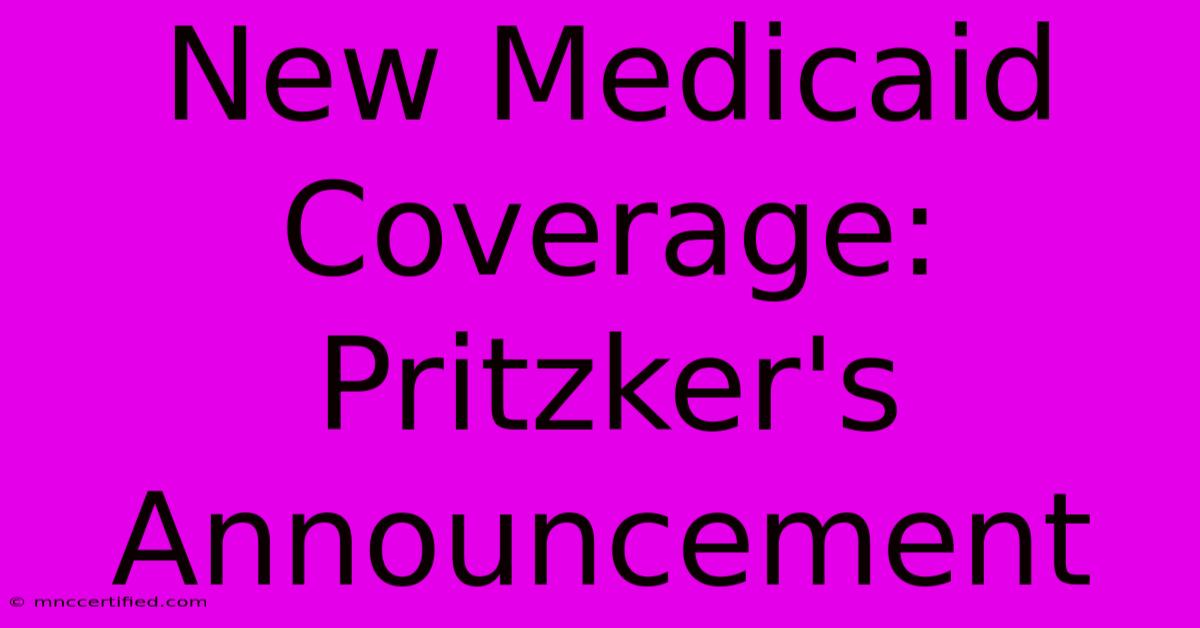New Medicaid Coverage: Pritzker's Announcement

Table of Contents
New Medicaid Coverage: Pritzker's Announcement Expands Healthcare Access in Illinois
Illinois Governor J.B. Pritzker's recent announcement regarding Medicaid expansion has sent ripples of hope across the state. This significant policy change promises to reshape healthcare access for thousands of Illinois residents, particularly those previously left vulnerable due to gaps in coverage. This article delves into the specifics of the announcement, its potential impact, and what it means for the future of healthcare in Illinois.
Key Highlights of Pritzker's Medicaid Expansion
Governor Pritzker's plan focuses on several crucial areas designed to broaden Medicaid eligibility and improve the overall quality of care:
-
Age Expansion: Perhaps the most impactful aspect is the lowering of the age limit for Medicaid eligibility. Previously, certain age groups faced limitations. This expansion removes these barriers, making healthcare more accessible to a larger segment of the population. This addresses a critical need for affordable healthcare among younger adults.
-
Income Eligibility Thresholds: The announcement also includes adjustments to income eligibility thresholds. By increasing the maximum income level that qualifies for Medicaid, more individuals and families struggling financially will now be eligible for vital healthcare services. This is a crucial step towards reducing healthcare disparities and ensuring equal access to care.
-
Improved Access to Behavioral Health Services: The expanded coverage isn't limited to physical health. A significant portion of the announcement focuses on expanding access to vital behavioral health services, including mental healthcare and substance abuse treatment. This proactive approach addresses the growing mental health crisis and strives to make vital services more readily available to those who need them most. This is a major victory for mental health advocacy groups.
-
Streamlined Enrollment Process: Recognizing that a complex enrollment process can deter eligible individuals from applying, the governor’s plan also includes initiatives to streamline and simplify the application process. Making it easier to sign up will undoubtedly increase the number of individuals benefiting from the expanded Medicaid coverage.
The Impact of Expanded Medicaid Coverage
The implications of Pritzker's announcement are far-reaching and potentially transformative:
-
Reduced Uninsured Rate: A primary goal is a significant reduction in the state's uninsured rate. By expanding eligibility, more individuals will gain access to preventative care, leading to improved overall health outcomes and fewer costly emergency room visits.
-
Improved Public Health: Early detection and treatment of illnesses are significantly more effective and less costly than managing advanced stages. Increased access to preventative care through Medicaid expansion will contribute to improved public health outcomes across the state.
-
Economic Benefits: While the expansion requires increased investment, the long-term economic benefits are substantial. A healthier population translates to increased productivity, reduced healthcare costs associated with untreated illnesses, and a stronger overall economy.
Who Benefits Most from this Expansion?
The benefits of this Medicaid expansion reach a broad spectrum of the Illinois population, but certain groups will see particularly significant improvements:
-
Low-income families: Families struggling to make ends meet will benefit tremendously from the expanded income eligibility thresholds.
-
Young adults: The lowered age limit will provide crucial healthcare access to a demographic often facing financial instability.
-
Individuals with pre-existing conditions: Expanded coverage ensures access to necessary ongoing care, regardless of pre-existing health conditions.
-
Individuals struggling with mental health or substance abuse: Enhanced access to behavioral health services is a critical lifeline for those facing these challenges.
Looking Ahead: Challenges and Opportunities
While the expansion represents a significant step forward, challenges remain:
-
Funding: Sustaining the expanded program requires ongoing financial commitment and efficient resource allocation.
-
Provider Capacity: Ensuring there are enough healthcare providers to meet the increased demand will be essential.
-
Public Awareness: Effective communication and outreach are crucial to ensure that eligible individuals are aware of the expanded coverage and how to apply.
Despite these challenges, Governor Pritzker's announcement marks a pivotal moment for healthcare in Illinois, offering a beacon of hope for a healthier and more equitable future for all residents. The expansion promises a significant positive impact on the lives of thousands, highlighting the importance of accessible and affordable healthcare for a thriving society.

Thank you for visiting our website wich cover about New Medicaid Coverage: Pritzker's Announcement. We hope the information provided has been useful to you. Feel free to contact us if you have any questions or need further assistance. See you next time and dont miss to bookmark.
Featured Posts
-
Superman Trailer 15 Key Reveals
Dec 20, 2024
-
Broncos Tnf Preview Game Outlook
Dec 20, 2024
-
Amazon Holiday Shipping Teamsters Strike Announced
Dec 20, 2024
-
51 Men Convicted Pelicot Assault Case
Dec 20, 2024
-
Tulip Siddiq Bangladesh Corruption Probe
Dec 20, 2024